

The Hylomorphic Doctrine of Pr Savard, François F. 5263. Mbc. Ontological Kinds Versus Biological Species: The American Journal of Bioethics: Vol 12, No 9. 8a5a09508a7b8528de97c1c1bd59ea4bd1dd. Concepts in Aristotle and Aquinas: Implications for current theoretical approaches. The purposive evolution of complexity - the major problem of natural selection theory. Fields and forces, or the gods and angels? Michael A. Woodley of Menie, Yr. - Google Scholar Citations. POSTDOCTORAL RESEARCH PROJECT: Aristotelian Causes in Modern Cosmology? Charles de Koninck's Philosophy of Science.
2013 14. Research – John G. Brungardt, Ph.D. Charles De Koninck. Hylomorphic Animalism, Emergentism, and the Challenge of the New Mechanist Philosophy of Neuroscience. Primary Sources Aristotle. 1984.
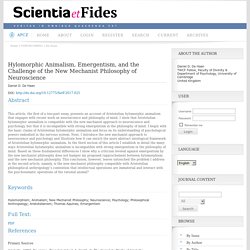
De anima. Translated by J. 2015 18 Krause Albert Great on Animal Human Origin. The Philosophy of Nature – International Catholic University. Maurer darwin aquinas. Thomistic Institute 1998: Wallace. Jacques Maritain Center: Thomistic Institute by William A.
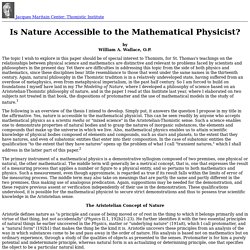
Wallace, O.P. The topic I wish to explore in this paper should be of special interest to Thomists, for St. Thomas's teachings on the relationships between physical science and mathematics are distinctive and relevant to problems faced by scientists and philosophers in the present day. "The Viability of the Aristotelian-Thomistic Account of Color Reali. The Thomist 65 (2001): 179-222 Christopher A.
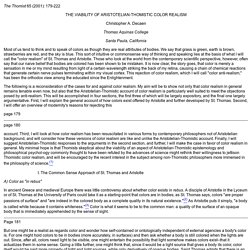
Decaen Thomas Aquinas College Santa Paula, California Most of us tend to think and to speak of colors as though they are real attributes of bodies. Why life is not a thing but a restless manner of being. Mike Russell found his moment of inspiration on a warm spring evening in Glasgow in 1983, when his 11-year-old son broke a new toy.

The toy in question was a chemical garden, a small plastic tank in which stalagmite-like tendrils grew out of seed crystals placed in a mineral solution. Although the tendrils appeared solid from the outside, when shattered they revealed their true nature: each one was actually a network of hollow tubes, like bundles of tiny cocktail straws. At the time, Russell, a geologist, was struggling to understand an unusual rock he had recently found. It, too, was solid on the outside but inside was full of hollow tubes, their thin walls riddled with microscopic compartments. It dawned on him then that this rock – like the formations in his son’s toy – must have formed in some unusual kind of liquid solution. That was a huge intuitive leap, but it soon led Russell to an even more outlandish thought. Why Is 'Systems Thinking' So Rare? Neurogenetic networks for startle-induced locomotion in Drosophila melanogaster. Author Affiliations Edited by Daniel L.
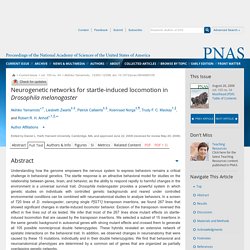
Hartl, Harvard University, Cambridge, MA, and approved June 22, 2008 (received for review May 20, 2008) Abstract Understanding how the genome empowers the nervous system to express behaviors remains a critical challenge in behavioral genetics. The startle response is an attractive behavioral model for studies on the relationship between genes, brain, and behavior, as the ability to respond rapidly to harmful changes in the environment is a universal survival trait. De ascensione mentis in deum per scalas. 2015 18 Krause Albert Great on Animal Human Origin.
Octopuses Do Something Really Strange to Their Genes - The Atlantic. Octopuses have three hearts, parrot-like beaks, venomous bites, and eight semi-autonomous arms that can taste the world.
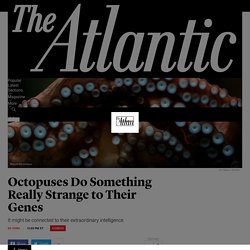
They squirt ink, contort through the tiniest of spaces, and melt into the world by changing both color and texture. They are incredibly intelligent, capable of wielding tools, solving problems, and sabotaging equipment. As Sy Montgomery once wrote, “no sci-fi alien is so startlingly strange” as an octopus. Philosophical Transactions of the Royal Society of London A: Mathematical, Physical and Engineering Sciences. Vitalism and scholasticism : Windle, Bertram Coghill Alan, Sir, 1858-1929. Evolution Perfect. The Image of the World in Antiquity « The Charles De Koninck Project. De Formis Coelestibus et Elementalibus in Prima Productione John of St.
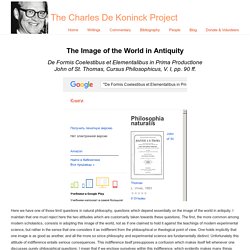
Thomas, Cursus Philosophicus, V. I, pp. 90 ff. Utrum Quia Experientia Decepti Aristoteles Et D. Thomas Causas Posuerunt Aequivocas In Natura Operantes « The Charles De Koninck Project. Utrum Quia Experientia Decepti Aristoteles Et D.
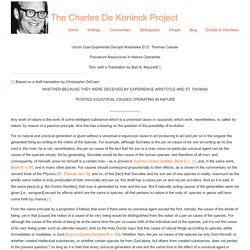
Thomas Causas. Untitled. Evolutionary Plasticity and Innovations in Complex Metabolic Reaction Networks. Abstract Genome-scale metabolic networks are highly robust to the elimination of enzyme-coding genes.
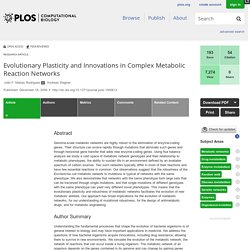
Their structure can evolve rapidly through mutations that eliminate such genes and through horizontal gene transfer that adds new enzyme-coding genes. Using flux balance analysis we study a vast space of metabolic network genotypes and their relationship to metabolic phenotypes, the ability to sustain life in an environment defined by an available spectrum of carbon sources. Caseofsound. Shapiro. CONFERENCES & WORKSHOPS. Spotlight Computer Science and the Evolution of Genetic Information Nancy A.
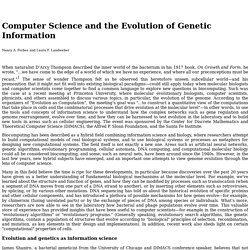
Forbes and Laura F. Landweber When naturalist D’Arcy Thompson described the inner world of the bacterium in his 1917 book, On Growth and Form, he wrote, "…we have come to the edge of a world of which we have no experience, and where all our preconceptions must be recast. "1 The sense of wonder Thompson felt as he observed this heretofore unseen subcellular world—and his premonition that it might not fit well into existing biological paradigms—could still apply today when molecular biologists and computer scientists come together to find a common language to explore new questions in biocomputing. Biocomputing has been described as a hybrid field combining information science and biology, where researchers attempt to build computational models of real biological systems, and to use biological systems or processes as metaphors for designing new computational systems.
Evolution and genetics as information science. "dicendum quod potentia cogitativa est id quod est altissimum in parte sensitiva, unde attingit quodam modo ad partem intellectivam ut aliquid participet eius quod est in intellectiva parte infimum, scilicet rationis discursu. Aquinas: The Cogitative Power (vis cogitativa) GetSharedSiteSession?rc=4&redirect= There are ever more compelling tools available for neuroscience research, ranging from selective genetic targeting to optogenetic circuit control to mapping whole connectomes. These approaches are coupled with a deep-seated, often tacit, belief in the reductionist program for understanding the link between the brain and behavior.
A first Latin reader: with exercises : Herbert Chester Nutting. Adaptation and the Form-Function Complex on JSTOR. Définition de la vie, les théories anciennes et la science moderne. Dès la plus haute antiquité, des philosophes ou des médecins célèbres ont regardé les phénomènes qui se déroulent dans les êtres vivans comme émanés d’un principe supérieur et immatériel agissant sur la matière inerte et obéissante. Telle est la pensée de Pythagore, de Platon, d’Aristote, d’Hippocrate, acceptée plus tard par les philosophes et les savans mystiques du moyen âge, Paracelse, Van-Helmont et par les scolastiques. Cette conception atteignit dans le cours du XVIIIe siècle son apogée de faveur et d’influence avec le célèbre médecin Stahl, qui lui donna une forme plus nette en créant l’animisme.
L’animisme a été l’expression outrée de la spiritualité de la vie ; Stahl fut le partisan déterminé et le plus dogmatique de ces idées perpétuées depuis Aristote. On peut ajouter qu’il en fut le dernier représentant ; l’esprit moderne n’a pas accueilli une doctrine dont la contradiction avec la science était devenue trop manifeste. Or le mot vie est dans ce cas. Heredity, development and evolution: the unmodern synthesis of E.S. Russell. Order in the Physical World and Its First Cause: According to Modern Science - T. J. Slevin - Google Books. Homeostasis and the Forgotten Vitalist Roots of Adaptation - Springer. Journals.uchicago. Reality - A Thomistic Synthesis: by Pere Reginald Garrigou-Lagrange, O.P. - Complete book online. Claude Bernard, the first systems biologist, and the future of physiology - Noble - 2007 - Experimental Physiology.